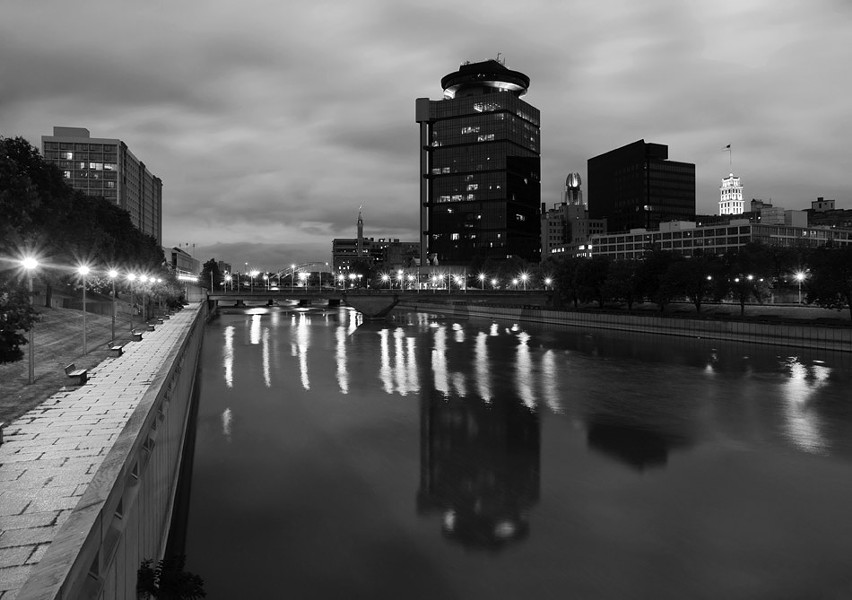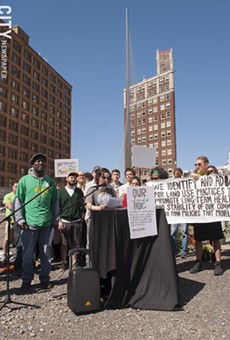We're losing this battle, and there's no sign that's going to change.
We're spending millions of dollars every year to combat poverty in Rochester, and we're losing this battle.
Every year for the past seven years, the organization known as ACT Rochester has released what it calls a Community Report Card, showing how the nine-county Greater Rochester area is doing in areas like poverty, health, and education.
And every year, the report tells the same story. You can find a few bright spots. But mostly, we're doing very, very badly.
Far too many residents of the City of Rochester are poor. They are disproportionately people of color. And that situation isn't getting better.
In 2012-2016, 54 percent of Rochester's Hispanic children and 53 percent of its African-American children were poor.
Seventy-six percent of the city's African-American families and 61 percent of Hispanic families were headed by single parents.
In the city school district in 2017, the four-year graduation rate for students – the vast majority of whom are children of color – was only 57 percent.
This is all connected. Poverty has an impact, in everything from health to education. And concentration of poverty – neighborhoods in which many of the residents are poor – causes enormous problems.
The City of Rochester has some of the worst concentrations of poverty in the state – and in the nation.
This is not news. The only news is that we're still doing very little about it except talking. We talk about it a lot. And we give. Money, food, clothing… time. We volunteer, at soup kitchens and schools and service organizations. All of that treats symptoms. We're doing almost nothing to address the poverty itself – or its concentration.
We're perfectly willing to address poverty, to help the poor, in ways that make us feel good, as long as poverty stays in its place.
But we're not about to let poverty come out where we are. We're as content to leave poverty in its place as we were when we put it there.
And we did indeed put it there. We put it in the specific blocks of inner-city neighborhoods in Rochester and New York City and Chicago and Detroit…. Poor people – and specifically, poor people of color – aren't living in concentrated poverty neighborhoods by accident. We put them there. And we did it deliberately. And we've done precious little to let them out.
Federal regulations, bank practices, local zoning codes, real estate practices, social service agency practices: all have limited where people of color can live. This is fact. And numerous academic studies and books have documented the results.
America's post-Civil War history is one of deliberate segregation: blatantly racist policies and actions. And for all our talk about helping the poor, for all our talk about overcoming racism, we have no intention of breaking up the concentration of poverty in housing or education.
We will let a few black children attend suburban schools through the Urban Suburban Transfer Program. But no suburban school district will step forward to help create an integrated city-suburban school. We'll applaud Habitat for Humanity's effort to build housing for the poor in the city's poorest neighborhoods. But no town official or suburban county legislator will lead an effort to ensure that housing is available for poor people of color in the suburbs.
And no state politician will suggest linking state funding to housing and education efforts that break up the concentration of poverty in the state's cities.
Decades of studies have shown that poor families do better, and poor children do better, when they're able to move to economically diverse neighborhoods and schools. None of those studies have caused us to change. And so we have another ACT Rochester report, showing that we're losing the battle against poverty. And there's no sign that's going to change. Because we'd prefer that it didn't.
We're spending millions of dollars every year to combat poverty in Rochester, and we're losing this battle.
Every year for the past seven years, the organization known as ACT Rochester has released what it calls a Community Report Card, showing how the nine-county Greater Rochester area is doing in areas like poverty, health, and education.
And every year, the report tells the same story. You can find a few bright spots. But mostly, we're doing very, very badly.
Far too many residents of the City of Rochester are poor. They are disproportionately people of color. And that situation isn't getting better.
In 2012-2016, 54 percent of Rochester's Hispanic children and 53 percent of its African-American children were poor.
Seventy-six percent of the city's African-American families and 61 percent of Hispanic families were headed by single parents.
In the city school district in 2017, the four-year graduation rate for students – the vast majority of whom are children of color – was only 57 percent.
This is all connected. Poverty has an impact, in everything from health to education. And concentration of poverty – neighborhoods in which many of the residents are poor – causes enormous problems.
The City of Rochester has some of the worst concentrations of poverty in the state – and in the nation.
This is not news. The only news is that we're still doing very little about it except talking. We talk about it a lot. And we give. Money, food, clothing… time. We volunteer, at soup kitchens and schools and service organizations. All of that treats symptoms. We're doing almost nothing to address the poverty itself – or its concentration.
We're perfectly willing to address poverty, to help the poor, in ways that make us feel good, as long as poverty stays in its place.
But we're not about to let poverty come out where we are. We're as content to leave poverty in its place as we were when we put it there.
And we did indeed put it there. We put it in the specific blocks of inner-city neighborhoods in Rochester and New York City and Chicago and Detroit…. Poor people – and specifically, poor people of color – aren't living in concentrated poverty neighborhoods by accident. We put them there. And we did it deliberately. And we've done precious little to let them out.
Federal regulations, bank practices, local zoning codes, real estate practices, social service agency practices: all have limited where people of color can live. This is fact. And numerous academic studies and books have documented the results.
America's post-Civil War history is one of deliberate segregation: blatantly racist policies and actions. And for all our talk about helping the poor, for all our talk about overcoming racism, we have no intention of breaking up the concentration of poverty in housing or education.
We will let a few black children attend suburban schools through the Urban Suburban Transfer Program. But no suburban school district will step forward to help create an integrated city-suburban school. We'll applaud Habitat for Humanity's effort to build housing for the poor in the city's poorest neighborhoods. But no town official or suburban county legislator will lead an effort to ensure that housing is available for poor people of color in the suburbs.
And no state politician will suggest linking state funding to housing and education efforts that break up the concentration of poverty in the state's cities.
Decades of studies have shown that poor families do better, and poor children do better, when they're able to move to economically diverse neighborhoods and schools. None of those studies have caused us to change. And so we have another ACT Rochester report, showing that we're losing the battle against poverty. And there's no sign that's going to change. Because we'd prefer that it didn't.

